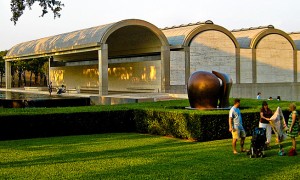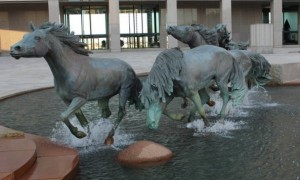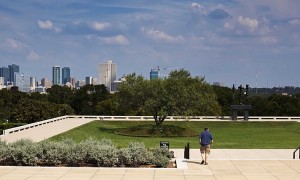Nicknamed Panther City after the Civil War, Fort Worth, Texas evolved from a small, frontier town to a thriving metropolitan city with a strong economic presence in the Southwestern United States. Founded in 1849 as a small garrison, Fort Worth grew substantially during the mid-1800s as it became an important trading post facilitated by its location on the Old Chisholm Trail—a popular route for ranchers herding cows from West Texas. Christened “Panther City” as a joke from Dallas-based newspaper employee, who poked fun at the city’s slow post-Civil War revitalization, Fort Worth residents proudly adopted the moniker as an alternative name for their city.
From Cow Town to Boom Town
While Fort Worth faced a devastating economic downtown after the Civil War like many other cities in the South, the arrival of the Texas & Pacific Railroad helped revitalize the once small frontier town. As a major rail station, Fort Worth quickly became a commercial hub and trading post. Eventually businesses established permanent roots in Panther City and the community began to quickly modernize. As a mainstay of the cattle trading industry, the city ultimately became the largest meat packing and processing center in the American Southwest.
Fort Worth’s Modern Economy
The local economy saw another unforeseen yet impressive economic boom when oil was discovered nearby in the early 1900s. Wealthy oil men and ranchers began operating from and living in Fort Worth because of its thriving commercial activity and proximity to major rail lines. Eventually, military installations were developed in Tarrant County which led to the development of the aviation industry brought on by the events of World War I and II.
With abundant offices and manufacturing centers in the information technology, aviation, and retail industries, Fort Worth’s largest employers include corporations such as Lockheed Martin Aeronautics, American Airlines, Radio Shack, and Bell Helicopter. The city is also home to universities and large hospitals that provide jobs and public services.
Today, Fort Worth locals still lovingly refer to their hometown as Panther City. The panther has become a mascot for local schools and city agencies. For example, police officers in Fort Worth proudly display a panther patch on their uniforms. While the area is now modernized with high-rise buildings and lavish homes, Forth Worth is still central to the cattle and meat packing industry. By staying true to the city’s roots and embracing modernity, locals benefit from a steady economy and a multicultural place to live.
[cf]skyword_tracking_tag[/cf]







[…] The …read more […]
[…] …read more […]
[…] …read more […]
[…] The …read more […]